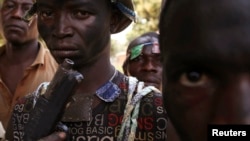GENEVA —
U.N. Secretary-General Ban Ki-moon is warning there could be further mass atrocities in the Central African Republic without an immediate end to the cycle of violence and retaliation in that country. The secretary-general’s warning was conveyed to the U.N. Human Rights Council, which is holding a special session on the human rights situation in the CAR.
Ban calls events unfolding in the Central African Republic a crisis of epic proportions. He said immediate and concerted action is required, otherwise sectarian violence will escalate and a growing Christian-Muslim divide will take deep root.
The acting director of the U.N. Office in Geneva, Michael Moller, delivered Ban’s message to the U.N. Human Rights Council.
“The Office of the High Commissioner for Human Rights and other U.N. entities have documented unspeakable and widespread human rights violations. These appalling abuses have divided Christian and Muslim communities that for decades have co-existed peacefully as neighbors and friends ... Religious tensions have not been part of the CAR’s past and they must not become part of its future.”
Speaking for himself, Michael Moller noted that reports of ongoing sectarian clashes in the CAR are adding further urgency to the U.N. debate.
“We cannot escape the fact that the tragedy in the Central African Republic was allowed to go unaddressed for too long. This special session is an important step towards ensuring that CAR does not remain a “forgotten crisis” and that a meaningful response is mobilized, by all actors,” said Moller.
This session is occurring against the backdrop of killings and ongoing abuse in the Central African Republic. The International Red Cross reports that at least 50 people were killed in violence during the weekend in the northwest region of the country.
U.N. Human Rights chief Navi Pillay has presented the Council with the results of a fact-finding mission that took place from December 12 to December 24. The report documents large-scale human rights violations perpetrated in the capital, Bangui, and other places by the ex-Seleka rebels, anti-Balaka militias, and by Muslim and Christian civilians.
These include summary executions, sexual and gender-based violence, enforced disappearances, torture, arbitrary arrests and detention.
Pillay said that since December 24, the U.N. peace-building office known as BINUCA has been receiving daily reports of civilian deaths in Bangui and other areas.
“I welcome the establishment of an international commission of inquiry by the Security Council, which will send a strong message to perpetrators of violations and abuses that the international community is committed to holding them accountable," said Pillay.
CAR Ambassador to the United Nations Leopold Ismael Samba told the Council the main causes of the crisis are the absence of a working government and desperate poverty. He says the international community has an urgent need to help restore law and order and development in his country.
Ban calls events unfolding in the Central African Republic a crisis of epic proportions. He said immediate and concerted action is required, otherwise sectarian violence will escalate and a growing Christian-Muslim divide will take deep root.
The acting director of the U.N. Office in Geneva, Michael Moller, delivered Ban’s message to the U.N. Human Rights Council.
“The Office of the High Commissioner for Human Rights and other U.N. entities have documented unspeakable and widespread human rights violations. These appalling abuses have divided Christian and Muslim communities that for decades have co-existed peacefully as neighbors and friends ... Religious tensions have not been part of the CAR’s past and they must not become part of its future.”
Speaking for himself, Michael Moller noted that reports of ongoing sectarian clashes in the CAR are adding further urgency to the U.N. debate.
“We cannot escape the fact that the tragedy in the Central African Republic was allowed to go unaddressed for too long. This special session is an important step towards ensuring that CAR does not remain a “forgotten crisis” and that a meaningful response is mobilized, by all actors,” said Moller.
This session is occurring against the backdrop of killings and ongoing abuse in the Central African Republic. The International Red Cross reports that at least 50 people were killed in violence during the weekend in the northwest region of the country.
U.N. Human Rights chief Navi Pillay has presented the Council with the results of a fact-finding mission that took place from December 12 to December 24. The report documents large-scale human rights violations perpetrated in the capital, Bangui, and other places by the ex-Seleka rebels, anti-Balaka militias, and by Muslim and Christian civilians.
These include summary executions, sexual and gender-based violence, enforced disappearances, torture, arbitrary arrests and detention.
Pillay said that since December 24, the U.N. peace-building office known as BINUCA has been receiving daily reports of civilian deaths in Bangui and other areas.
“I welcome the establishment of an international commission of inquiry by the Security Council, which will send a strong message to perpetrators of violations and abuses that the international community is committed to holding them accountable," said Pillay.
CAR Ambassador to the United Nations Leopold Ismael Samba told the Council the main causes of the crisis are the absence of a working government and desperate poverty. He says the international community has an urgent need to help restore law and order and development in his country.








